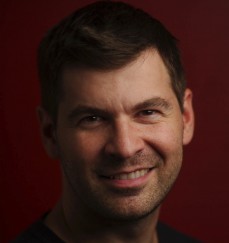 I write with shock and sadness over yesterday’s deaths of Chris Hondros and Tim Hetherington in Libya. In February, Tim showed his short film DIARY at STF and gave a thoughtful discussion afterward. We met only a few times, so others can testify to his career better than me. But I knew Chris for many years and want to add a few thoughts.
I write with shock and sadness over yesterday’s deaths of Chris Hondros and Tim Hetherington in Libya. In February, Tim showed his short film DIARY at STF and gave a thoughtful discussion afterward. We met only a few times, so others can testify to his career better than me. But I knew Chris for many years and want to add a few thoughts.
The New York Times Lens blog has published a tribute that does a fine job of getting Chris’ attributes, the way he defied the cliches of war reporting as a person. He was level-headed, neither cynical nor indulgently romantic about his profession. He took a long view of history as the son of European immigrants who had memories of WWII. He was very good with words which you can hear in his NPR interview or read in his articles. Those pieces were often written for small publications or blogs, less for career advancement than for the urge to contribute as an eyewitness. Chris had earned the security of employment at Getty Images, but he took great pleasure in side projects like setting images to music for small performances.
He was my favorite dinner companion, possessing a rare perspective on what’s happening in the world, but also a good listener. He was quick-witted. He liked teaching. He took interest in other people’s work. One of his last Facebook messages was to congratulate colleagues who had won awards.
He didn’t have the self-destructive bent that characterizes some war reporters. He could plan ahead. We were plotting an event in Toronto this June to show his Tahrir Square photos. He was going to get married in August. Outsiders might consider his whole profession foolhardy. But I think he considered it a privilege, albeit a dangerous one. He told an interviewer, “you see humanity at its worst, but to me it’s balanced by the fact that you also see humanity at its best. I’ve seen such examples of courage and human generosity.”
The urge to make sense of his death risks its own cliches of grandiosity. If Chris had a choice of where to die, I’m sure he wouldn’t have picked Misurata – a place so remote that newspapers can’t even agree on its spelling. While it may be obscure to us, for others it’s home where hundreds of Libyans have been killed in recent weeks. Chris, Tim and their colleagues were attempting to tell that story. Perhaps we don’t like the story – it doesn’t contain the right heroes or feel destined for a happy ending. But, still, there are lives at stake of people who are as dear to their families as Chris was to me. Why wouldn’t that be a story worth telling?
If you pressed Chris about the danger of his job, he’d point out that no one gets to pick where he dies. Or when. So just hunker down, do your best work and try to leave something of lasting value. That’s what he did.







